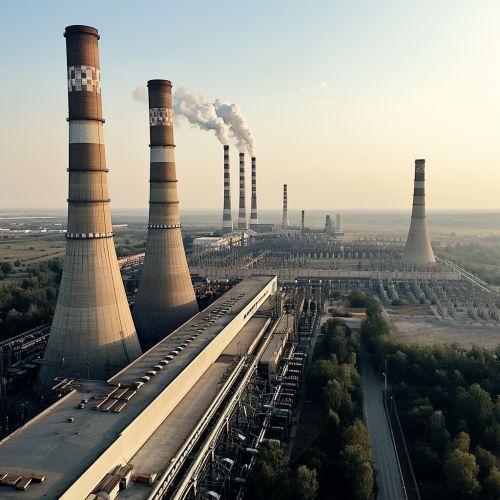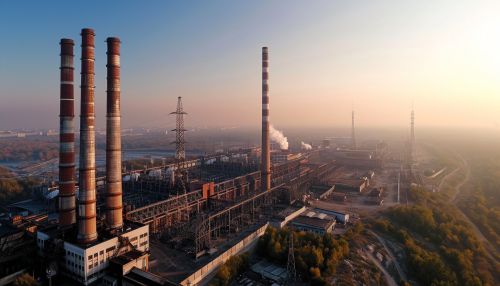Energy in Ukraine
Energy Overview in Ukraine
Ukraine is a country in Eastern Europe that is rich in various types of energy resources. The country's energy sector is diverse and includes significant coal, natural gas, and nuclear resources. However, Ukraine's energy sector has faced numerous challenges, including aging infrastructure, inefficient energy use, and dependence on foreign energy supplies, particularly from Russia.


Energy Resources
Ukraine has a wide range of energy resources, including coal, natural gas, oil, uranium, and hydropower. The country also has significant potential for renewable energy development, particularly in wind, solar, and biomass energy.
Coal
Coal is one of the most abundant energy resources in Ukraine, with the country having the second-largest coal reserves in Europe. The coal industry in Ukraine has historically been a major contributor to the country's economy, providing a significant portion of its energy needs. However, the industry has faced numerous challenges, including aging infrastructure, environmental concerns, and the ongoing conflict in Eastern Ukraine, which has disrupted coal production in the region.
Natural Gas
Ukraine has significant natural gas reserves, but production has been declining in recent years due to a lack of investment in exploration and production. The country is heavily dependent on imports to meet its natural gas needs, particularly from Russia. This dependence has led to numerous disputes with Russia over gas prices and supply interruptions.
Nuclear Energy
Ukraine has a significant nuclear power industry, with 15 reactors at four nuclear power plants. The country's nuclear power industry provides about half of its electricity. However, the industry has faced numerous challenges, including the legacy of the Chernobyl disaster, aging infrastructure, and concerns about safety and waste disposal.
Renewable Energy
Ukraine has significant potential for renewable energy development. The country has favorable conditions for wind, solar, and biomass energy production. However, the development of renewable energy in Ukraine has been slow, due to a lack of supportive policies and investment.
Energy Policy
Ukraine's energy policy has been shaped by a number of factors, including its energy resource endowment, its geopolitical position, and its economic and political transition. The country's energy policy has focused on improving energy security, promoting energy efficiency, and developing renewable energy.
Energy Security
Energy security is a major concern for Ukraine, due to its heavy dependence on foreign energy supplies, particularly from Russia. The country has taken steps to diversify its energy sources and reduce its dependence on Russian gas, including increasing domestic gas production, developing alternative gas supply routes, and promoting energy efficiency.
Energy Efficiency
Ukraine has one of the highest levels of energy intensity in the world, due to inefficient energy use in industry, buildings, and transport. The country has implemented a number of energy efficiency measures, including energy audits, energy performance standards, and energy efficiency financing programs. However, progress in improving energy efficiency has been slow, due to a lack of investment and institutional barriers.
Renewable Energy Policy
Ukraine has implemented a number of policies to promote renewable energy development, including feed-in tariffs, green certificates, and tax incentives. However, the development of renewable energy in Ukraine has been slow, due to a lack of supportive policies and investment.
Energy Infrastructure
Ukraine's energy infrastructure includes power plants, transmission and distribution networks, gas pipelines, and storage facilities. The country's energy infrastructure is aging and in need of modernization.
Power Plants
Ukraine has a diverse mix of power plants, including coal, natural gas, nuclear, and hydropower plants. The country's power plants have a total installed capacity of about 54 GW. However, many of the country's power plants are aging and in need of modernization.
Transmission and Distribution Networks
Ukraine's electricity transmission and distribution networks are owned and operated by the state-owned company Ukrenergo. The networks are aging and in need of modernization, due to a lack of investment in infrastructure maintenance and upgrade.
Gas Pipelines and Storage Facilities
Ukraine has a significant gas pipeline network, which is used for domestic gas transportation and for transit of Russian gas to Europe. The country also has significant gas storage facilities, which are used to store gas for domestic use and for transit.
Energy Sector Challenges
Ukraine's energy sector faces a number of challenges, including aging infrastructure, inefficient energy use, dependence on foreign energy supplies, and the ongoing conflict in Eastern Ukraine.
Aging Infrastructure
Ukraine's energy infrastructure is aging and in need of modernization. The country's power plants, transmission and distribution networks, and gas pipelines are in need of upgrade and maintenance, due to a lack of investment in infrastructure.
Inefficient Energy Use
Ukraine has one of the highest levels of energy intensity in the world, due to inefficient energy use in industry, buildings, and transport. The country has implemented a number of energy efficiency measures, but progress has been slow, due to a lack of investment and institutional barriers.
Dependence on Foreign Energy Supplies
Ukraine is heavily dependent on foreign energy supplies, particularly from Russia. This dependence has led to numerous disputes with Russia over gas prices and supply interruptions, and has made the country vulnerable to energy supply disruptions.
Conflict in Eastern Ukraine
The ongoing conflict in Eastern Ukraine has disrupted coal production in the region, which has affected the country's energy supply and economy.
